A Virginia Farm Leads the Way in Certified Regenerative Practices
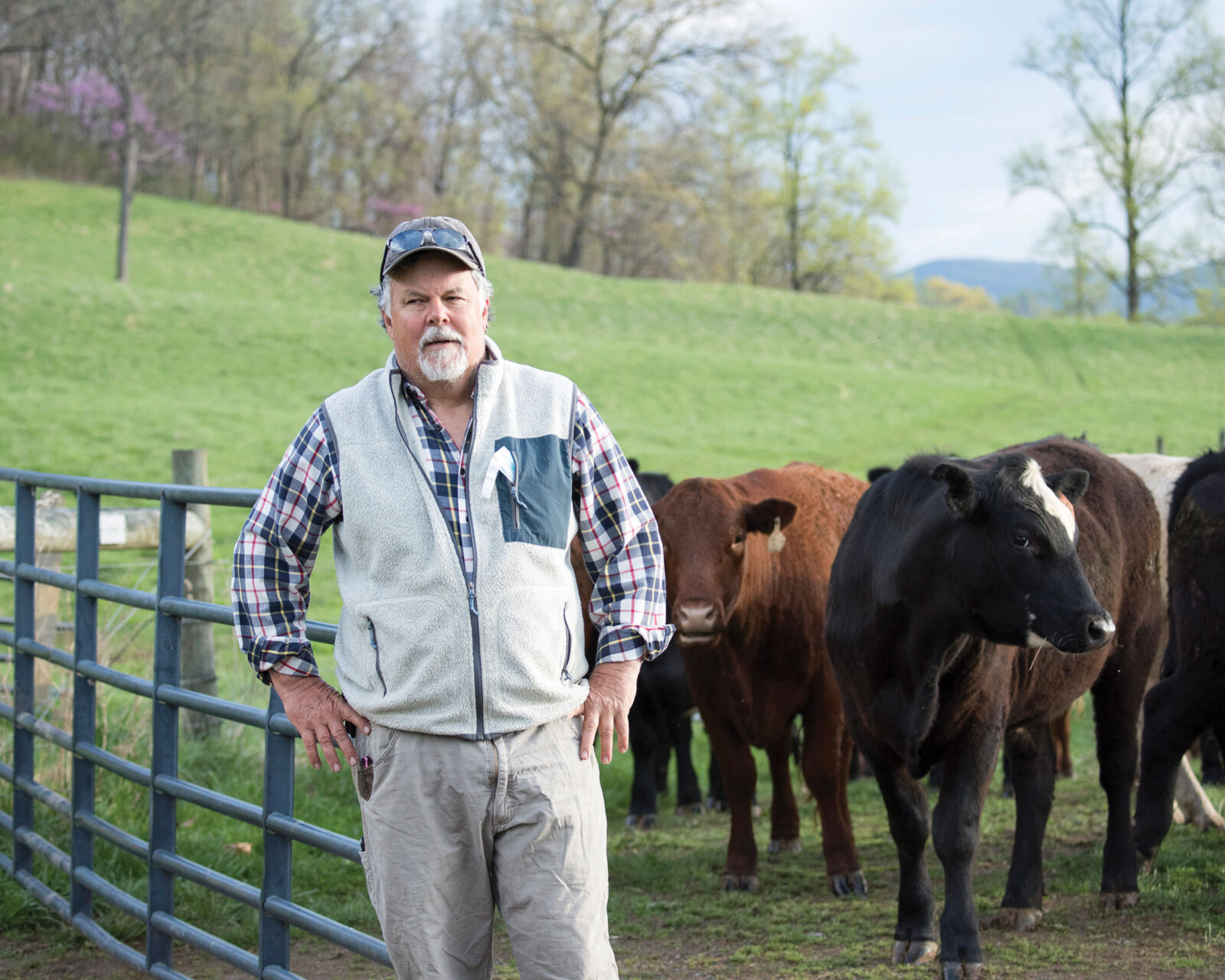
A Virginia Farm Leads the Way in Certified Regenerative Practices
Written by Heidi Baumstark | Photos by Joanne Maisano
Healthy input equals healthy output. That’s definitely true for livestock farms following practices that maintain robust ecosystems interacting in balance with each other. The result? Nutritious feed for animals culminating in prime meat cuts for people.
Over Jordan Farm in Flint Hill, Va. is home to Bean Hollow Grassfed, a 200-acre grazing livestock operation in rural Rappahannock County that raises sheep, cattle, and pigs. At Bean Hollow, they believe the intensive management of pasture-raised, grassfed livestock improves soil health producing nutritious, chemical-free grass for animals that yield the highest quality lamb, beef, pork — plus popular bratwursts made from each of the three meats.
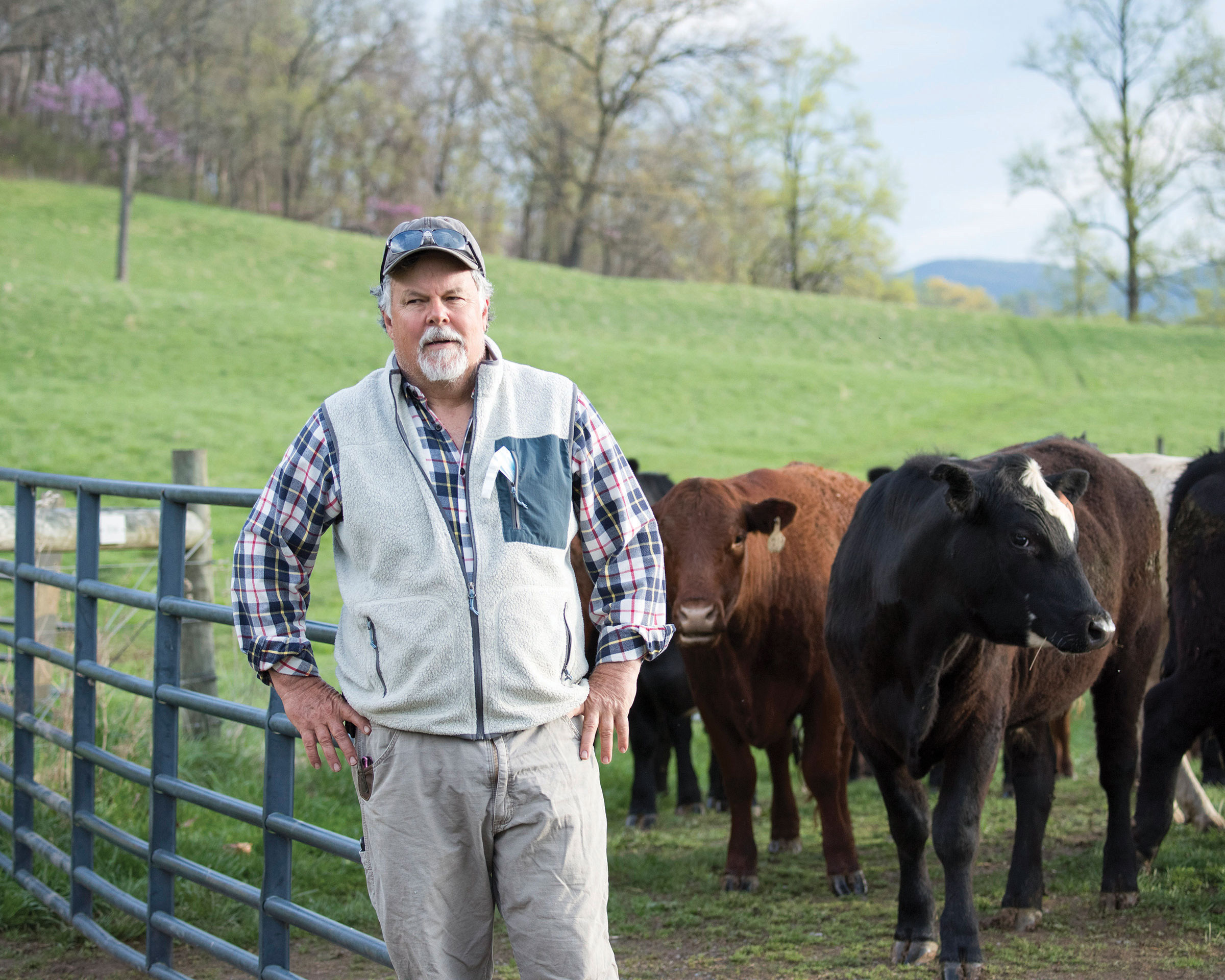
Mike Sands at Over Jordan Farm, Bean Hollow Grassfed.
The current property owner, Betsy Dietel, says the land was originally purchased in 1980 by her parents, Bill and Linda Dietel, who raised Polypay sheep, running a successful meat and wool operation for over 20 years. Then in 2000, the fields were leased to a neighboring farmer.
Dietel wanted to be closer to her parents, so she and her husband, Mike Sands, moved to the family farm in 2012. Soon, Sands started up the farm again. It made sense since he spent his entire career in agriculture, mostly focusing on organic and community-supported agriculture in the U.S. and overseas. With a Ph.D. from Cornell University in animal science and international agriculture, he led research and has been a trusted consultant on a variety of projects, but had never run his own commercial operation. Combining decades of knowledge with the opportunity to run the family farm, Bean Hollow was born out of his desire to put into practice a lifetime of experience.
“It’s like background-met-opportunity,” Sands says. And his sustainable farming practices are getting deserved recognition.
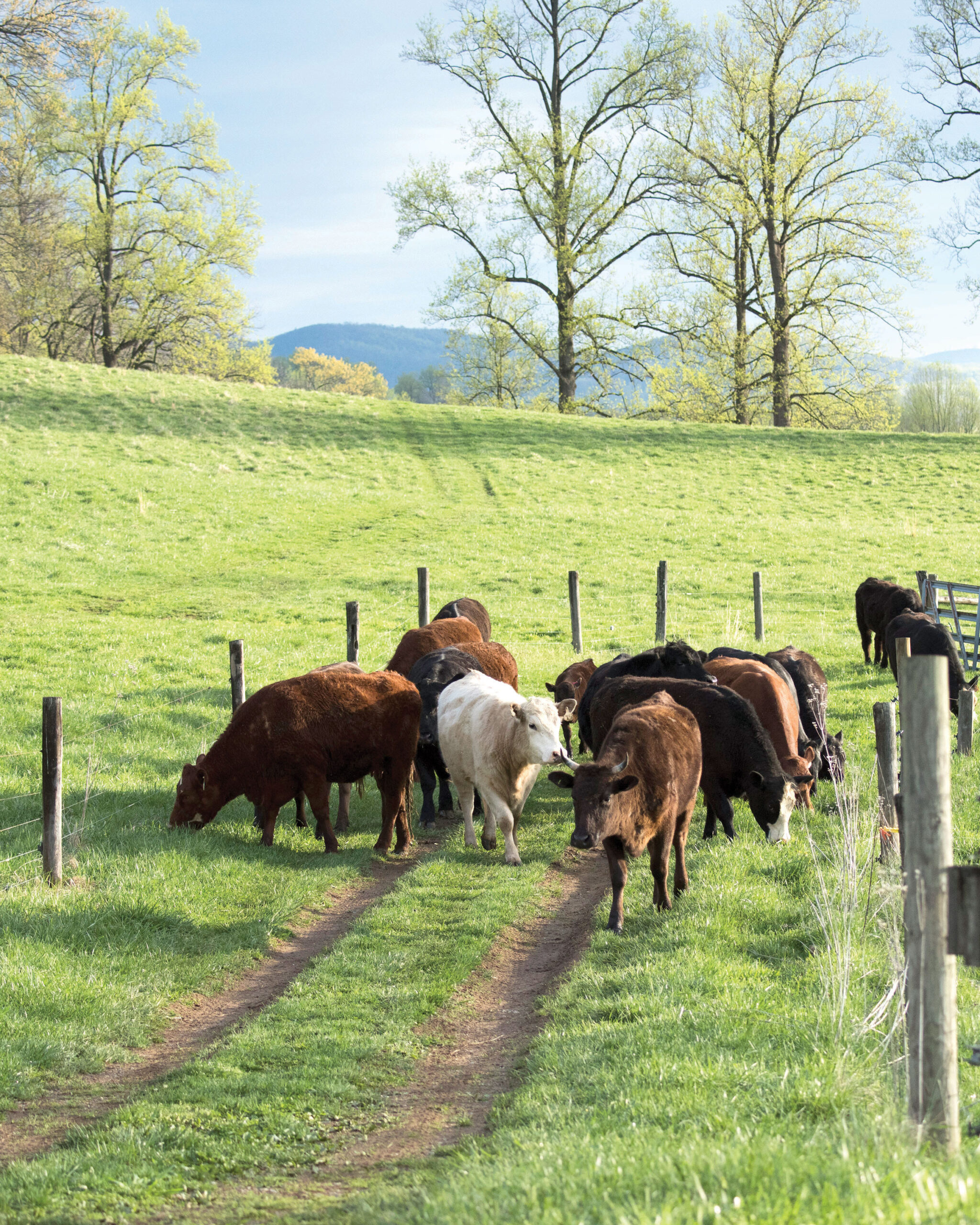
A Greener World (AGW) Certifications
Recognition comes in the form of certifications from A Greener World (AGW), a global organization established in 2014, which offers guidance to farmers and ranchers promoting practical models for truly sustainable livestock farming systems. AGW certifies the sheep at Bean Hollow in their certified animal welfare approved by AGW and certified grassfed by AGW programs. Part of AGW’s promotion comes in the form of providing farmers full-service certification with marketing, labeling, and technical support.
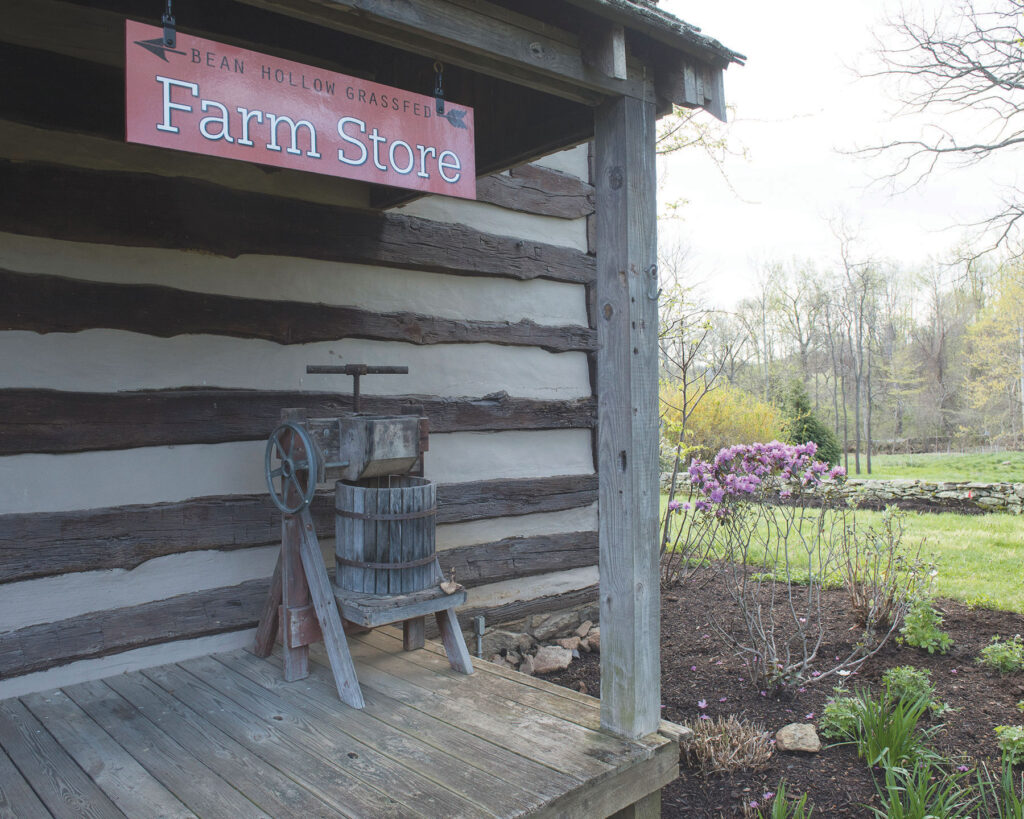
Bean Hollow Grassfed’s Farm Store log cabin
“Producers raising certified animals in these programs are industry leaders in animal welfare, outdoor access, and sustainability,” Callie Casteel, AGW’s Farmer and Market Outreach Coordinator, says.
Sands says he got his two AGW certifications in 2017. His lamb is certified, since to be certified animal welfare approved by AGW, the product must be from birth-to-slaughter on the same farm. His beef and pork are not, simply because Sands buys young animals and then raises them on his farm.
“Cattle and lamb are 100 percent grass fed and are in one big herd, which we call a ‘flherd’ since they get treated as one unit for the most part,” he says. “Some are pulled out in separate field rotations. Pigs are in a different system in their own location, and they get extra feed because their stomachs are different, and they can’t live on just grass.” Pigs are rotated in a couple of wooded areas, but with enough light streaming through so grass can grow for feed; there is also access to a small pasture.
Fertilizer? No need for it since the animals’ own manure naturally fertilizes the soil. And in the winter, Sands buys hay and unrolls it in the fields. The hay that has not been eaten by the animals rots down becoming fertilizer, eliminating the need for chemicals.
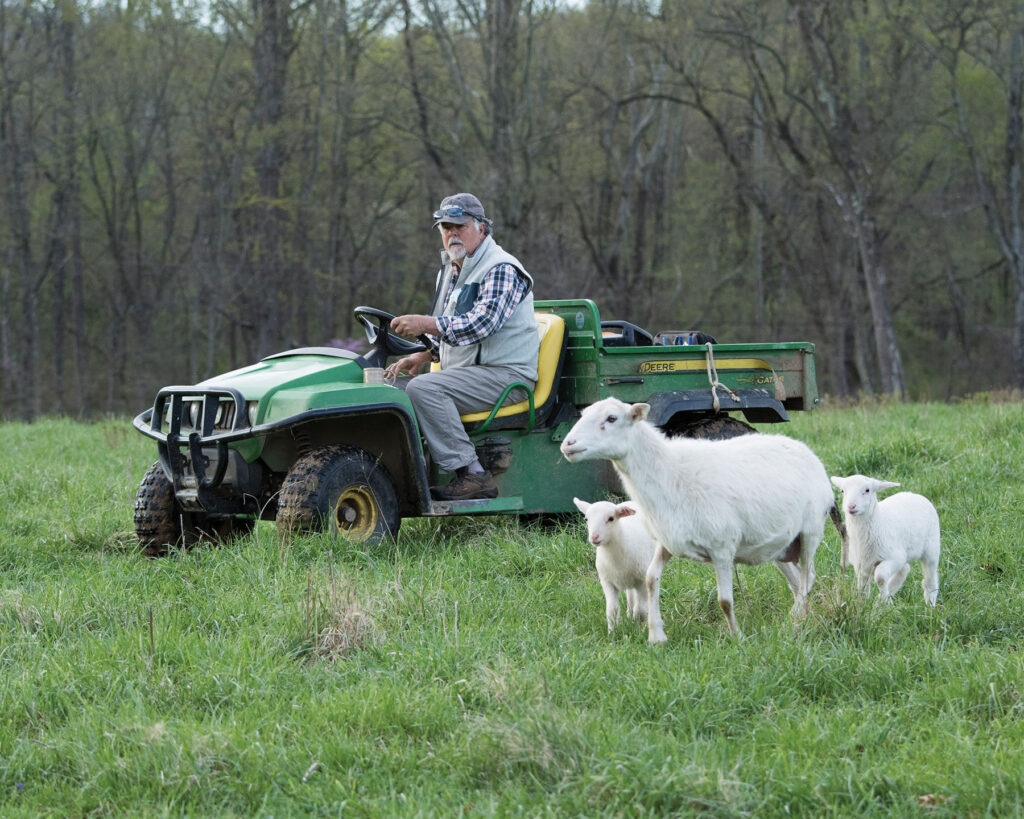
Once a year, AGW comes out to perform the equivalent of an audit. “They go through my books, all the paperwork, they look at the animals,” Sands says. “It’s one of the few programs that include actual visits to the farms — that’s what sets them apart. And they offer the widest spread of certifications.”
Recently, AGW added another certification with a new pilot program: certified regenerative by AGW, which AGW defines as “a set of planned agricultural practices that ensure the holding is not depleted by agricultural practices, and over time, the soil, water, air, and biodiversity are improved or maintained to the greatest extent possible.” Regenerative farming means that all parts of the farming system are improved or maintained at the optimum level. Fifty farms across four continents will be selected for this inaugural pilot with certification expected in 2021.
“When we opened the application period, we experienced a flood of interest from farms around the globe,” Casteel says.
Sands says that AGW called and invited him to apply for this new certification.
Casteel says certified regeneration by AGW “incorporates the high welfare, environmentally-sustainable practices our farms like Bean Hollow Grassfed are known for — practices that are a key part of regenerative farming.” Bottom-line consumers are seeing the benefits of credible certification programs and the importance of their independent assessments.
Feeling Hungry?
Visit Bean Hollow’s Farm Store, an historic log cabin near the farm’s entrance, open daily from dawn to dusk. Pick up packaged meats and sausages, each in its own freezer, categorized by meat type. There are even printed recipes for guests to take home. Whole broiler chickens will be available starting mid-May; and on occasion, fresh farm eggs are sold. Adding to its value, the property, located in the foothills of the Blue Ridge Mountains near Shenandoah National Park, is forever protected by a conservation easement through the Virginia Outdoors Foundation.
And happy customers are talking. “We loved visiting and seeing all your animals,” Sam Hopps of Washington, D.C. says. “Thanks for taking the time to ‘walk and talk.’ Understanding the care you take with your animals and land makes the meat that much better.”
“Your lamb is perfect,” Sylvia Rowand of Washington, Va. says. “Beautiful, subtle flavor, and tender as butter! We’ll be back by this weekend.”
Can’t make it to the farm? No problem. They sell at Rappahannock’s Farmers Market in Sperryville on Saturdays, 10 a.m. – noon, at Pen Druid Brewing located at 3863 Sperryville Pike (U.S. Rt. 522). Amanda Frye works with Sands selling their meats at the market. “She’s grown from hired hand to apprentice to acting farm manager,” he says.
For the last 15 to 20 years there has been a steady interest in local foods, but with COVID in 2020, it exploded, Sands says. The amount of home cooking has dramatically increased business, and he also works with chefs who order his meats.
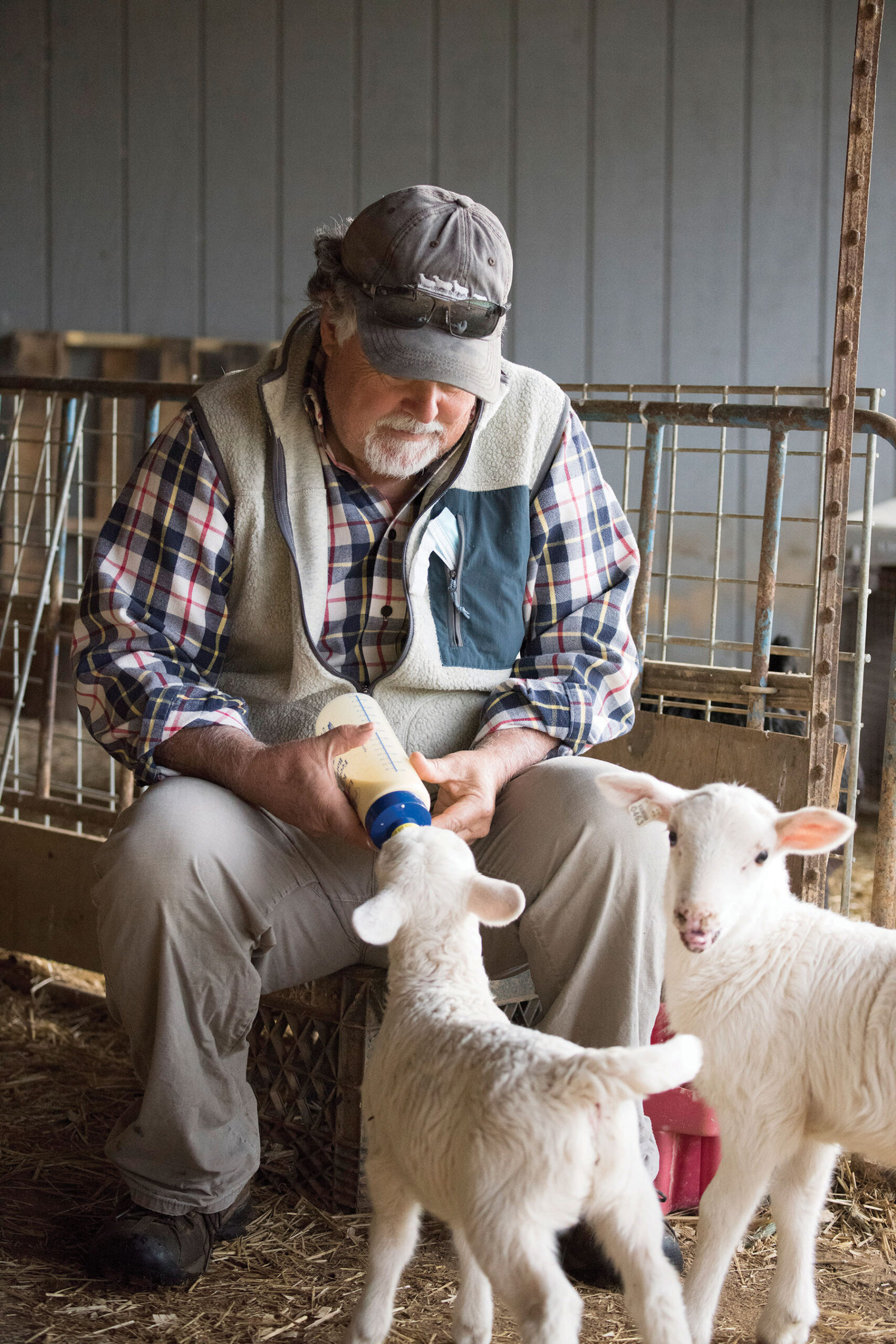
Mike Sands caring for the sheep at Over Jordan Farm.
“Demand was higher than expected. Much, much higher,” he says. “We literally had empty freezers, we were selling so fast. Eight-to-nine hundred pounds of beef would be gone in a few days. Bones, soup bones, liver, heart — everything.” High-quality meat is a major part of every diet (except for vegan and vegetarian) and is gluten free.
“I’ve worked in agriculture all my life,” Sands says. “I’ve been a consultant, have developed national projects, and worked overseas putting together research programs. I was managing director for an organic research institute and have talked to thousands of farmers over the years. When I retired from my last job, I thought, ‘Mike, you’ve been telling people all your life what to do — now prove it to yourself.’”
Sands calls his fate on the farm a combination of background merging with opportunity. “I believed this property was something that could be rehabilitated, so I thought, ‘OK, let’s do it.’” ML
Visit Bean Hollow’s Farm Store at 15 Over Jordan Farm Lane in Flint Hill. More information can be found at beanhollowgrassfed.com. For questions about product availability, call 540-675-1025 or email [email protected]. More about Rappahannock Farmers Market can be found
at rappfarmersmarket.com.


